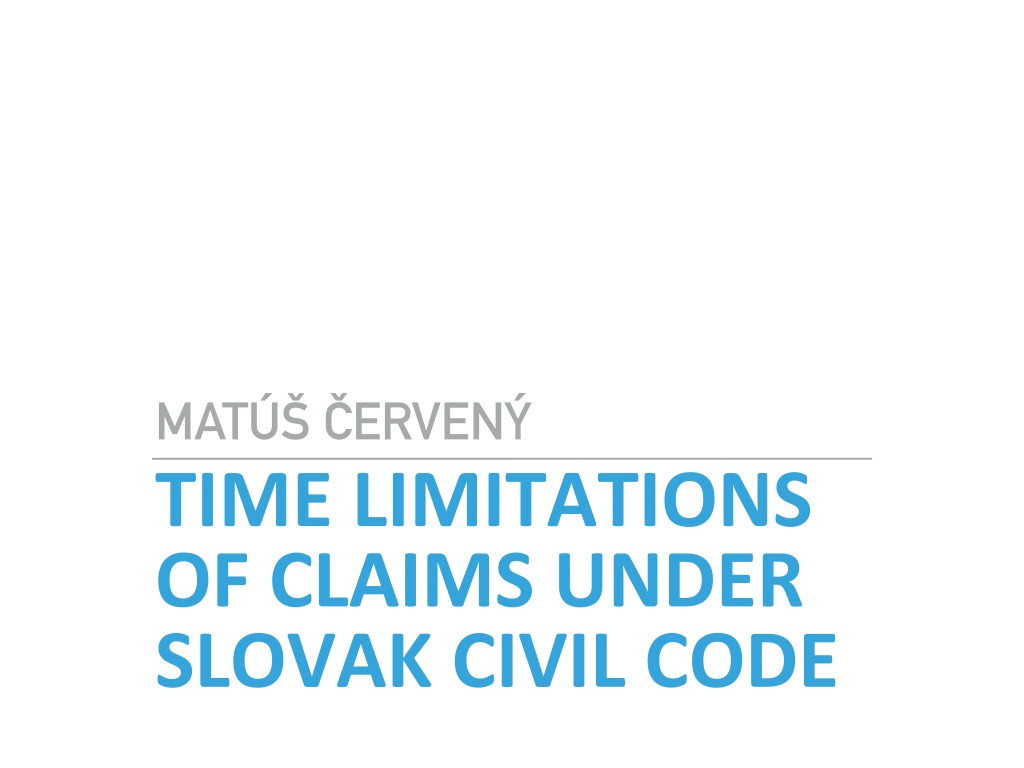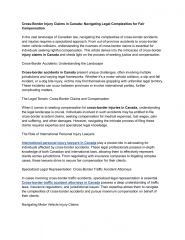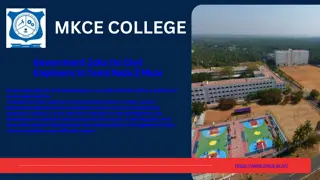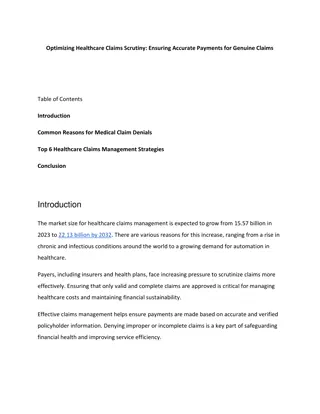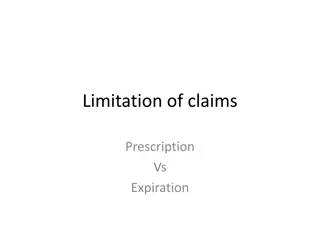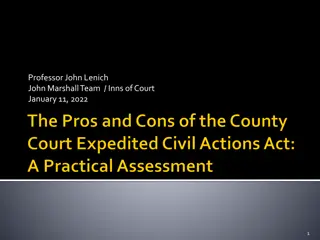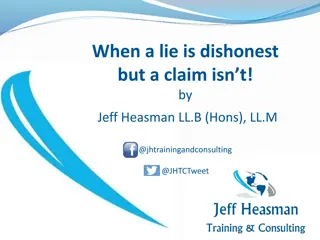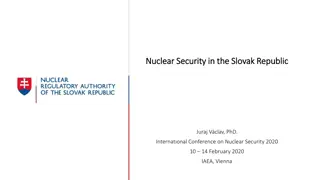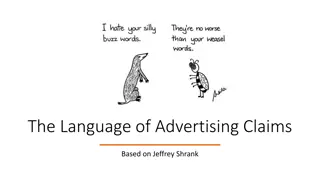Slovak Civil Code - Time Limitations of Claims
The Slovak Civil Code, consisting of nine parts, regulates various legal matters including statutes of limitation for claims. It covers legal acts, rights and duties, statute of limitations, and specifics on different types of rights. The general limitation period is three years unless specified otherwise, starting from when the right could first be exercised.
Download Presentation

Please find below an Image/Link to download the presentation.
The content on the website is provided AS IS for your information and personal use only. It may not be sold, licensed, or shared on other websites without obtaining consent from the author. Download presentation by click this link. If you encounter any issues during the download, it is possible that the publisher has removed the file from their server.
E N D
Presentation Transcript
MAT ERVEN TIME LIMITATIONS OF CLAIMS UNDER SLOVAK CIVIL CODE
The Federal Assembly of the Czech and Slovak Federal Republic has adopted the Act as follows ACT OF THE CZECH REPUBLIC NO. 40/1964 SB. CIVIL CODE Slovak Civil Code officially consists of 9 PARTS which are divided into CHAPTERS and those can be further divided into TITLES. I. General provisions 1- 122 (KSIE GA PIERWSZA: CZE S C OG LNA) II. Real rights 123 - 180 (KSIE GA DRUGA: W ASNOS C I INNE PRAWA RZECZOWE) III., IV. and V. 181 - 414 were repealed but the numbering remains VI. Liability for damages and unjustified enrichment 415 - 459 (falls under KSIE GA TRZECIA ZOBOWIA ZANIA) VII. Succession 460 - 487 (KSIE GA CZWARTA: SPADKI) VIII. Law of obligations 488 - 852 (KSIE GA TRZECIA ZOBOWIA ZANIA) IX. Final, inter temporal and repealing provisions 853 - 880
TITLE I, CHAPTER I CC LEGAL ACTS Facts that create, modify, terminate legal relationships or rights and duties Civil legal relationships shall arise from legal acts or from other facts resulting in the rise of these relationships according to an act. 2 Subjective legal facts - depend on the will of a person Objective legal facts - passing of a time, natural disasters Statute of limitation Statute of repose
TITLE I, CHAPTER 8 CC STATUTE OF LIMITATION A right shall become statute-limitated unless it was exercised during the time period stipulated in this Act ( 101 to 110). The court shall take the statute of limitation into consideration only upon an objection of the debtor. If the debtor appeals to the statute of limitation, the statute-limitated right can not be awarded to the creditor. Only upon an objection The right does no cease to exist. Only the possibility to claim at court It isa natural obligation
TITLE I, CHAPTER 8 CC WHICH RIGHTS ? 100 All property rights except for ownership can become statute-limitated. The provision of 105 shall not be affected by this rule. A lien shall not become statute-limitated before the secured receivable. Rights following from deposits on saving books or other kinds of deposits or deposits on current accounts shall not become statute-limitated until the end of the deposit relationship.
TITLE I, CHAPTER 8 CC GENERAL LIMITATION PERIOD 101 Unless anything else is stipulated in the following provisions, the limitation period shall be three years long and shall start running from the day when the right could be exercised for the first time. Unless the right does not fall under next provisions ( 101 - 110) the possibility to claim that right ceases to exist after 3 years.
TITLE I, CHAPTER 8 CC SPECIFIC SITUATIONS 102 - 110 As for rights that are to be asserted at first with an individual or a legal entity, the limitation period shall start running from the day when the right was asserted in this way. 102 If the parties agreed on instalment performance, the limitation period of the individual instalments shall start running from their due day. If the whole debt becomes due because of non-fulfilment of one instalment ( 565), the limitation period shall start running from the due day of the non-fulfilled instalment. 103 As for rights following from insurance, the limitation period shall start running after the lapse of one year after the insurance event. 104 As for right of the lawful heir to demand surrendering the inheritance ( 485), the limitation period shall start running from the moment when the decision finishing the inheritance proceedings became final and conclusive. 105 (1) Right to compensation of damage shall become statute-limitated in two years from the day when the damaged person learnt of the damage and of the liable person. subjective period
TITLE I, CHAPTER 8 CC SPECIFIC SITUATIONS 102 - 110 (1) Right to demand surrendering of an unjustified enrichment shall become statute- limitated within two years from the day when the entitled person learnt of the unjustified enrichment and of the enriched person. (2) The right to demand surrendering of the unjustified enrichment shall become statute- limitated no later than in three years and, as for an unjustified enrichment gained by intention, in ten years from the day when it came thereto. 107 Rights from transport shall become statute-limitated within one year except for rights to compensation of damages from the transport of persons. 108 Right corresponding to an easement shall become statute-limitated unless it is exercised for ten years. 109 A right that was awarded by a final and conclusive decision of the court or other authority shall become statute-limitated within ten years from the day when the liable party was to perform according to the decision. A right that was acknowledged by the debtor in writing as for its title and sum shall become statute-limitated within ten years from the day when it came to the acknowledgement; however, if a performance period was
TITLE I, CHAPTER 8 CC COURSE OF LIMITATION PERIOD 111 - 114 Change in the person of creditor or debtor shall have no influence on the course of the limitation period. 111 If the creditor exercises his right with a court or other competent authority during the limitation period and properly continues in the commenced proceedings, the limitation period shall not run from the moment of the exercise during the proceedings. This rule shall also apply to a finally and conclusively awarded right in case of that an enforcement of a decision was applied for with a court or other competent authority. 112 As for rights of persons who must have a legal representative or for rights against these persons, the statute of limitation shall not start until a representative is appointed to them. An already running limitation period shall go one running; however, it shall not end within one year after a legal representative is appointed to these persons or after this impediment expires otherwise. 113 As for a right between legal representatives on one side and minor children or other represented persons on the other, the limitation period shall neither start running nor go on running unless the matter is interest or repeated performance. The same rule shall apply also to rights between spouses. 114
STATUTE OF REPOSE The right to compensation of damages must be vindicated at the operator without undue delay. The right shall become extinct unless it was vindicated no later than on the fifteenth day after the day when the damaged party learnt of the damages. 436 Not the title to claim that right but the right itself ceases to exist Does not have general provisions, only in the situations explicitly stated in CC
